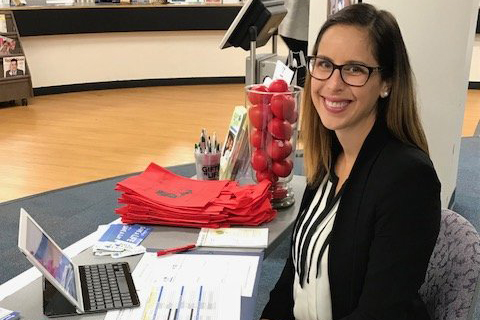
On Monday, Oct. 1 – Wednesday, Oct. 3, students, faculty, staff and community members will have the opportunity to register as an organ and bone marrow donor and at the 7th Annual Organ & Bone Marrow Donor Registration Drive. One OUWB faculty member who has a special connection to the drive is Stefanie Attardi, Ph.D., assistant professor.
In her early teenage years, Attardi learned that her younger cousin was in need of a bone marrow transplant in order to treat a rare, serious genetic disease. She, alongside other family members, was tested, and though she wasn’t a match for her cousin, she consented to join the Canadian national registry, OneMatch Stem Cell & Marrow Network.
Identified as a match
Years later, Attardi received a call from OneMatch, informing her that she was a match for someone and requesting that she donate her stem cells. “It was like winning the lottery,” she says. “Not because I specifically was the match, but because they were able to identify a good donor for the recipient.”
Her cousin and the difficulties they experienced finding a donor on her mind, she immediately agreed to donate. “It really wasn’t a decision for me,” she says. “It had the potential to save a life with next to no risk to me. It was something so little on my part that could change the life of someone and their loved ones.”
In the days leading up to her donation, Attardi received injections of a drug to stimulate her bone marrow stem cells to divide and make their way out to the circulation. “It made my bones feel moderately achy because they were working hard to make new stem cells,” she says. “It felt like when your muscles are sore from exercising, but the soreness was located deeper in the body where the bones are.”
Joining saves lives
She reports that the procedure was painless and that the initial soreness began to subside as soon as the donation was over. Shortly after, her blood was tested to ensure that it returned to normal.
Throughout the donation process, from the appointments, travel and tests done before the procedure to the check-ups afterward, Attardi recalls feeling concerned about the recipient. “My role in the donation process was relatively easy, and I worried about what the recipient and their family were going through,” she says. “Whoever they are – they are the heroes in this story.”
She hopes for a good turnout at this year’s Organ & Bone Marrow Donor Registration Drive because students and faculty are given the opportunity to potentially help someone in a way that no one else can. “You have the potential to save a life,” she says. “For certain conditions, it is a patient’s only hope for a cure or improved quality of life.”
She suggests that, even if a transplant is unsuccessful or the opportunity to donate never arises, the act of donating is important because it gives hope to those still waiting to find their matches.
The Drive will be held at Kresge Library on Oct. 1 and 3 and on the second floor of the Human Health Building on Oct. 2 from 10 a.m. - 2 p.m. each day.

